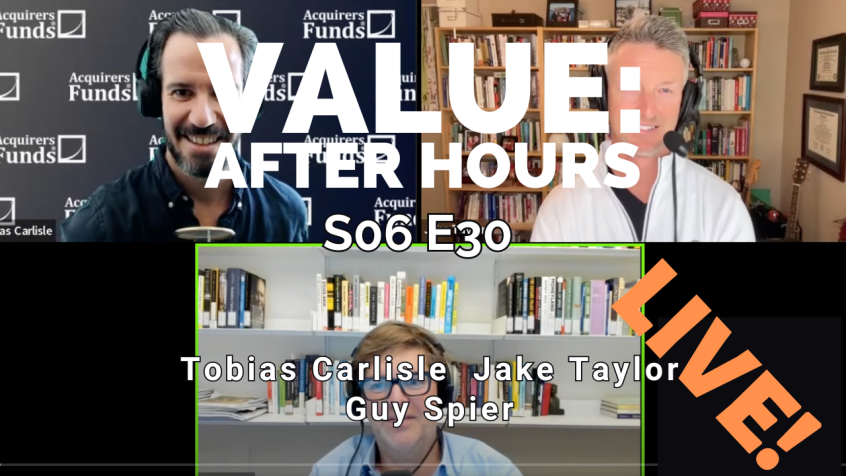During their recent episode, Taylor, Carlisle, and Guy Spier discussed How the Lollapalooza Effect Drives Influence. Here’s an excerpt from the episode:
Guy: It’s a little bit of this Lollapalooza effect. Two places one can go there. I’ll start off with a book that I recently read about Russian special measures, and then I’ll move onto more familiar territory, Warren Buffett. But it’s the same point. It’s the same idea, so you’ll like it. Well, I think you should like it. I was trying to understand Russian influence in Western politics. There’s great books that have been written about it. The one I think is called Special Measures. So, don’t ask me to cite the name of the book. I can’t remember the author. That’s terrible.
So, think of this. Karl Marx writes about a future revolution that will happen when the proletariat rise up, and overthrow capital and that capital is oppressing the proletariat. But he’s thinking of the bourgeoisie. He’s thinking of industrialized UK. He’s not thinking of Russia. Don’t ask me why. These guys in Russia, end of World War II, end of the Romanov Dynasty– World War I, forgive me. These guys want to create a revolution in Russia. But they don’t have an industrial society, the way with people slaving away in factories. They have serfs. They’re trying to find ways to convince the serfs and people who work the land to rise up within this Marxist theory.
I don’t think Marx really wrote. He talked about societies going through stages of development where the last stage would be communism, and just before that was capitalism. Russia was not really capitalist. It was just like a bunch of very rich people owning vast properties and serfs who owned nothing. Anyway, those guys, the first secret police, I think, was called the Cheka. They’re trying to figure out ways to sell the serfs on rising up and joining the revolution. So, this is a tradition that eventually became the KGB and eventually became the FSB or departments therein.
This book takes you through the reader, through stories that were planted in Western press, where the story was designed in such a way that in the same idea, with what we were just talking about past life therapy or conspiracy theories, the denial of the story actually reinforces the story, because it makes people even more suspicious in a way– I really have no idea. If we go out and accuse Donald Trump, say, “Donald Trump, you were in a Moscow hotel and you did things that you shouldn’t have done, and you were videoed and they have compromised on you.”
So, if Donald Trump goes and says, “That’s utter lies. That never happened.” The more he says it, the more people suspect. The lady doth protest too much has got this beautiful, beautiful feature to it. Isn’t that fun? Or, it’s fun for them, and it’s something that we have to combat. So, I think that I’ve become super aware of those things. So, I just talked about finding directors for CARE Ratings. That’s my little conspiracy theory. So, the more I talk about it, the more likely it is to happen.
So many people do that. The people who are doing crypto are doing it. The guy who is shorter company, the more he can talk about his thesis, the more likely it is to break, the more likely people are to lose confidence in the management. The more I talk about CARE Ratings, and I’ll stop doing it because I think it’s disingenuous, the more likely they are to become a global brand. So, I just want to keep saying CARE Ratings, [Jake laughs] CARE Ratings, CARE Ratings, CARE Ratings.
Guy: By the way, just very briefly, that’s a huge part or an important part of the ratings business model, is that if I want to say India’s credit has deteriorated, I don’t sound very credible. If I say Moody’s downgraded India’s credit rating, now I sound super credible. The guy at Moody’s knows no more than I do.
Jake: [chuckles] Right.
Guy: But if I say Moody’s downgraded or the credit committee, then it sounds better. I don’t even have to say Moody’s downgraded. It can say, “Analysts at Moody’s in private conversation suggested that India might be downgraded.” But now, Moody’s, their name keeps appearing. And people need to have credibility, so they don’t want to say. I think this or analyst thinks or somebody I told who thinks. So, they say, “Moody’s thinks.” That’s the same phenomenon again. So, just to move to Warren Buffett. I think that once you see that pattern, you find ways to do it in your own life, which is so much fun.
You can find out more about the VALUE: After Hours Podcast here – VALUE: After Hours Podcast. You can also listen to the podcast on your favorite podcast platforms here:
For all the latest news and podcasts, join our free newsletter here.
Don’t forget to check out our FREE Large Cap 1000 – Stock Screener, here at The Acquirer’s Multiple:



